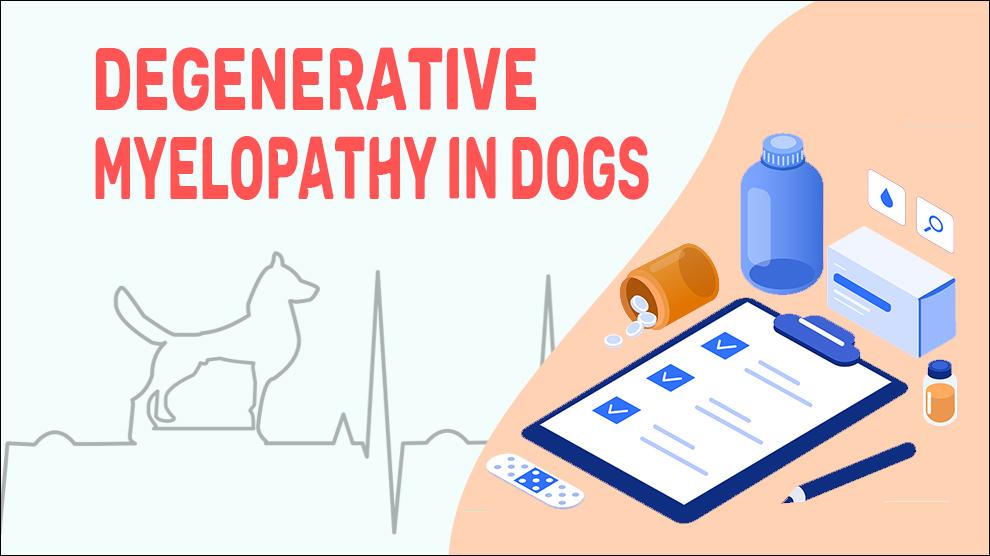What Is Degenerative Myelopathy In Dogs?
Degenerative Myelopathy (DM) is a genetic disease that affects dogs, specifically their spinal cord.
It is caused by a mutation in the SOD1 gene, which leads to the degeneration of the myelin sheath that surrounds and protects nerve fibers in the spinal cord.
This results in progressive hind limb weakness and eventually paralysis. As the disease progresses, it can also affect the front limbs, respiratory muscles, and other organs.
Symptoms Of Degenerative Myelopathy In Dogs
Symptoms of DM typically begin to appear in dogs between the ages of 8 and 14 years old.
The first signs are often weakness and wobbliness in the hind limbs, which can progress to difficulty standing up or walking.
As the disease progresses, the dog may lose control of their bladder and bowel functions and may experience muscle wasting and loss of reflexes.
In the later stages of the disease, the front limbs may also be affected, and the dog may become completely paralyzed.
The severity of DM can vary from dog to dog, but it is generally considered a progressive and ultimately fatal disease.
There is no cure for DM, but supportive care and physical therapy can help manage symptoms and improve quality of life.
DM is most commonly seen in German Shepherds, but it can also affect other breeds such as Boxers, Pembroke Welsh Corgis, and Rhodesian Ridgebacks.
It is more commonly seen in purebred dogs and is believed to be inherited in an autosomal recessive pattern.
Treatment Options For Degenerative Myelopathy In Dogs
There is currently no cure for degenerative myelopathy in dogs, but supportive care and physical therapy can help manage symptoms and improve quality of life.
Treatment options may include:
Physical therapy: This can help maintain mobility and strengthen the muscles. A veterinary rehabilitation specialist may recommend exercises such as hydrotherapy or range of motion exercises.
Mobility aids: Devices such as slings, carts, and harnesses can help support the dog's weight and allow them to continue to move around.
Medications: While there is no medication to cure DM, some drugs may help manage symptoms such as pain and inflammation.
Diet: Feeding a high-quality, balanced diet may help support the dog's overall health.
Home Remedies For Degenerative Myelopathy In Dogs
There are no known home remedies for DM. However, providing a supportive environment for the dog can help improve their quality of life.
This may include:
Providing soft bedding to prevent pressure sores
Using ramps or stairs to help the dog move around the house
Providing a consistent routine and plenty of attention to keep the dog's spirits up
How To Prevent Degenerative Myelopathy In Dogs?
DM is a genetic disease, so prevention involves careful breeding practices. Breeders should test their dogs for the DM gene mutation and avoid breeding dogs that carry the mutation.
Potential puppy buyers can also ask breeders if their dogs have been tested for DM before purchasing a puppy.
Affected Dog Breeds Of Degenerative Myelopathy
Boxer, Pembroke Welsh Corgi, Rhodesian Ridgeback
Causes For Degenerative Myelopathy In Dogs
Causes:
DM is caused by a mutation in the SOD1 gene, which leads to the degeneration of the myelin sheath that surrounds and protects nerve fibers in the spinal cord.
The exact mechanism by which this mutation leads to the development of DM is not fully understood.
When To See A Vet For Degenerative Myelopathy In Dogs?
If you notice any signs of hind limb weakness or difficulty walking in your dog, it is important to schedule an appointment with a veterinarian.
While DM is not curable, early diagnosis and management of symptoms can help improve the dog's quality of life.
Food Suggestions For Degenerative Myelopathy In Dogs
Feeding a high-quality, balanced diet may help support the dog's overall health. It is important to work with a veterinarian to determine the appropriate diet for your dog's individual needs.
Some dogs with DM may benefit from a diet that is high in protein and low in fat, as excess weight can put additional stress on their weakened muscles.
Supplements such as omega-3 fatty acids and antioxidants may also be beneficial.
Conclusion
In conclusion, DM is a genetic disease that affects dogs and leads to progressive hind limb weakness and eventual paralysis.
It is caused by a mutation in the SOD1 gene and primarily affects the spinal cord, but can also affect other parts of the body.
While there is no cure for DM, supportive care and physical therapy can help manage symptoms and improve quality of life.
It is most commonly seen in German Shepherds and other purebred dogs and is inherited in an autosomal recessive pattern.

















